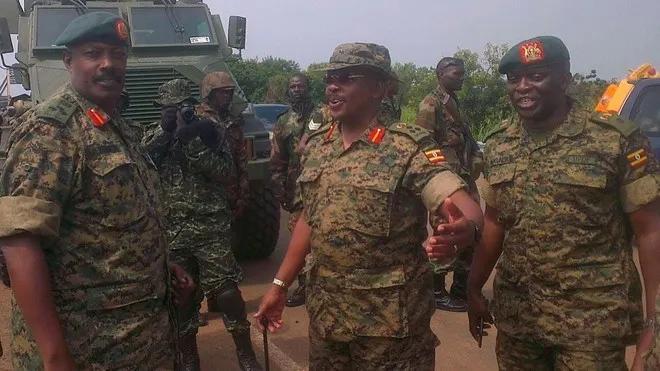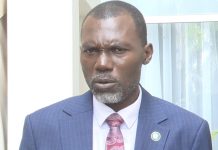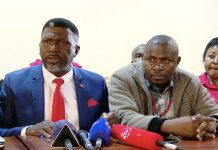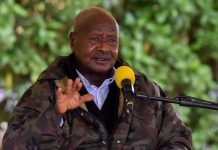Faridah N Kulumba
Africa-Press – Uganda. Ugandans are still mourning the death of dozens of soldiers who were killed in a deadly attack by the al Shabaab militants last month at its army base.
At the beginning of this month, the President of Uganda Yoweri Kaguta Museveni announced that 54 Uganda People’s Defence Forces (UPDF) soldiers were killed after al-Shabaab fighters stormed the base in Bulamarer, 130 kilometers (80 miles) southwest of the Somali capital, Mogadishu.
Mr. Museveni said that the militants were about 800 according to data captured by unmanned aerial vehicles (UAV), commonly known as drones.
The attack followed the Somali militant group al Shabaab overrunning Buulo Mareer Forward Operating Base (FOB) in coordinated attacks using car-laden explosives and gunfire and carried out a massacre of Ugandan troops. The attackers reportedly detonated four to six explosions, including improvised bombs in vehicles driven by suicide bombers.
In 2007 Uganda became part of the African Union Mission in Somalia (AMISOM) which ensured Somalia was liberated from al Shabaab Islamic insurgents. Uganda was the first country to send troops to Somalia and this opened the way for other African countries including Djibouti, Kenya, and Ethiopia to also deploy in the mission which was at one time dubbed as “dead on arrival” until UPDF’s arrival.
In March 2022, the Peace and the Security Council of the African Union issued a communique detailing the mandate of the African Transition Mission in Somalia (Atmis). It said the new mission which replaced the African Union Mission in Somalia or Amisom, would continue to fight the al Shabaab militant group and develop the capacity of Somali Armed Forces (SAF) to take over security.
Both Uganda and Somalia military officials said that such attacks like the one on the UPDF always scuttle drawdown plans of foreign armies regardless of the timelines.
What next for Uganda for UPDF presence in Somalia
As soon as the attack happened the government of Uganda deployed more land forces to Somalia under the leadership of Lt Gen Kayanja Muhanga, the commander of Land Forces to devise the way forward.
Uganda’s President Gen Museveni who is also a commander in chief of the UPDF issued a statement saying that the Chief of Defense Forces, Gen Wilson Mbadi set up a probe team to beef up the investigation into the attack. In his first statement, Mr. Museveni warned the Al-Shabab militants that the operations are continuing and that they will regret their actions.
In a statement Museveni shared on his Twitter account a day after the incident he blamed the attack on the UPDF’s poor performance. He elaborated that during the attack some of the soldiers did not perform as expected and panicked, which led to disorganization and the al-Shabaab took advantage of that to overrun the base and destroy some of the equipment.
Due to him, the UPDF panic was totally unnecessary due to the fact that both the anti-tank ditch and the Ugandan troops had destroyed three vehicles of explosives outside the Forward Operating Base (FOB). The suicide bombers or whatever were forced to blow themselves up before they gained entry into the base.
Besides that UAVs were watching the whole incident from up in the sky and directing fire.
The FOB is manned by troops from the UPDF’s Uganda Battle Group (Ugabab)38. It deployed in Somalia this year in April to start its tour of duty under the African Union Transition Mission in Somalia (Atmis).
The statement also revealed that when the attack started, many of the soldiers withdrew to the next FOB, nine kilometers away, because the Al Shabaab outnumbered the soldiers at the Buulo Mareer base. That happened because the militants were many, about 800 or so according to the UAVs.
The President revealed that two other commanders namely Oluka and Obbo, both at the rank of major, had been taken into custody, pending their trial at the General Court Martial for allegedly ordering soldiers to
withdraw instead of repulsing the attackers
It remained unclear what the officers, one of whom the President previously named as Maj Okia, before re-identifying the suspects as Oluka and Obbo, would be charged with.
Maj. Gen. (Rtd) Nathan Mugisha, Uganda’s Deputy Ambassador to Somalia said that what happened to the UPDF army in Somalia will not distract their mission. He added that they will continue with the Somalia stabilization processes, supporting the Federal Government, the Somali National Army, and the people so that they can have stability, economic development, and transformation.
Is Amisom achieving its goals in Somalia?
According to the researchers facilitated by the United Nations (UN) and African Union (UN), Amisom has had some successes but also failures. The mission’s successes can be noticed especially when viewed against the state Somalia was in before some African countries were deployed in the country.
Since the collapse of Mohamed Siad Barre’s government in 1991, Somalia had not been with a central government. The vacuum created by Barre’s departure triggered a civil war between clan warlord Ali Mahdi and Mohammed Farah Aideed.
Amisom’s existence in Somalia has tried to help fix the country’s security challenges by reducing the threat caused by al Shabaab militants and other armed opposition groups while also providing security to drive Somalia’s political process and efforts at reconciliation, according to Effectiveness of Peace Operations Networks (EPON) a consortium of more than 40 research institutions studying the effectiveness of peace operations.
The researchers say that Amisom has also succeeded in driving the al Shabaab out of Somalia’s major cities. Adding that the mission has also created a conducive environment for numerous international actors, including the UN to return to Somalia.
Even though the Amazon has succeeded in certain areas, it has failed in a major role in defeating al Shabaab. Observers say that military means alone cannot eliminate the al Shabaab if the mission is to succeed it will take Somalia’s federal and regional leaders to reconcile and come up with a plan that prioritizes political dialogue, which can result in a lasting solution.
For More News And Analysis About Uganda Follow Africa-Press






